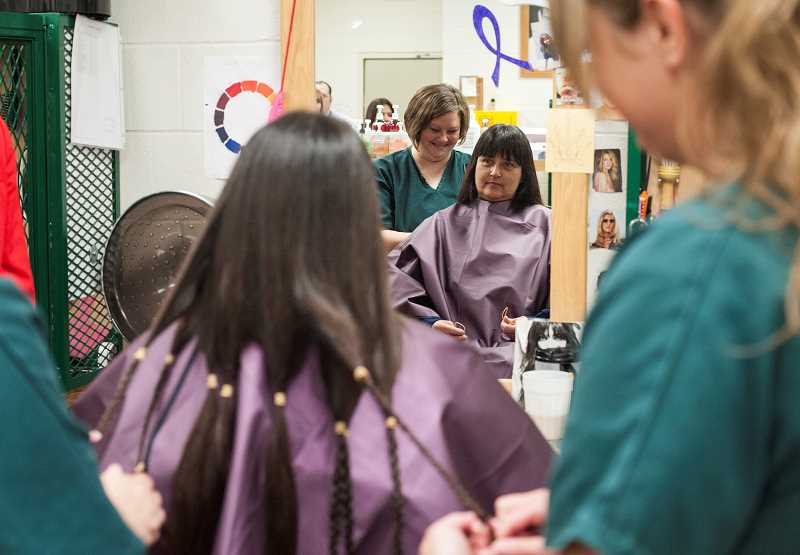In recent years, the rates of women incarcerated have grown faster than those of men. With national attention being brought to mass incarceration and prison reform though cases such as Alice Marie Johnson's, it has led some to delve deeper into the treatment of women within the U.S. prison system.
PHOTO: PrisonPolicy.org
Women experience very unique struggles while imprisoned, including: Lack of access to sanitary necessities, dealing with inhumane manners of giving birth to their children, sexual assault/abuse by male workers, etc. The Formerly Incarcerated Reenter Society Transformed Safely Transitioning Every Person Act, known as the First Step Act, was passed by the House in May. According to Vox, it would:
- Encourage inmates to participate in more vocational and rehabilitative programs, by letting them get "earned time credits" that allow them to be released early to halfway houses or home confinement.
-
Increase the amount of "good time credits" that inmates can earn. Inmates who avoid a disciplinary record can currently get credits of up to 47 days per year incarcerated. The bill increases the cap to 54, allowing well-behaved inmates to cut their prison sentence by an additional week for each year they’re incarcerated.
-
Authorize more funding — $50 million a year over five years — to support more programs. It also directs cost savings toward reentry and anti-recidivism programs.
The bill also makes other changes aimed at improving conditions in prisons, including banning the shackling of women during childbirth and requiring that inmates are placed closer to their families.
While some argue this bill may not do what is expected for prison reform and mass incarceration recidivism, other advocates are hopeful it will assist in lowering the federal prison population. In regards to rehabilitative programs in prison, while some do not receive the funding they deserve, many of the functioning programs show their ability to positively engage inmates and encourage them to stay on the straight-and-narrow after leaving those facilities.
PHOTO: Refinery29
Oregon’s Coffee Creek Correctional Facility's cosmetology program Hair Design, which is founded and directed by Tammy Kennedy, is a pristine example of a program helping female inmates prepare for life after prison. Students in Hair Design work 10 hour days, four days a week, on clients who are also apart of the facility's inmate population. After successfully graduating from the program, students can walk away with a cosmetology license, confidence in their skills and a new outlook on career opportunities post-imprisonment.
Kennedy shared the program’s features with Refinery29, including the binder she calls "Tammy’s Success Stories." Since Hair Design’s humble beginnings almost 16 years ago, Kennedy has helped 89 women graduate with their licenses and only six of her students have returned to prison since being released.
"I have some students that have gone out and gotten really nice jobs and are doing great with their careers and rejoining their families. I had a student that, when she first started the program, was like, 'I don't wanna do this or that.' But we kept with it and she worked really hard, and when she left here she opened a Paul Mitchell partner school. One student just opened her own salon," Kennedy told Refinery29. "There are lots of students that start really down and out, but then they pick themselves up and realize that they can really do this! People make mistakes, but now it's, 'What are you gonna do to change that and bring it to a positive in your life?' You can't change what happened, but now you can change where you go forward from here."
PHOTO: KOIN
Working in a beauty shop environment provides access to particular instruments, such as curling irons and other tools to help alter appearances, but Kennedy assures safety is a top priority in their area.
"Security (in prison) is really important for everyone; it's important for the students, it's important for the clients, it's important for me. Part of that is making sure the tools are all accounted for, that they don't go somewhere else in the facility where something could happen with them. We have tool cages that have shadows behind each item, and hair color is in a locked cabinet…"
In addition to the skills learned in the classroom, students are learning to consciously monitor their communication with others. Hair Design is a profanity-free zone and students are told they are not allowed to reference criminal behavior while they are there.
"Would you talk like that to a client when you're in a salon? If not, then you can't talk like that here. We work on that every single day, as well as the things that brought them here, trying to let go of some of those things to be the best person they can be when they leave," Kennedy said.
PHOTO: Refinery29
And while the students’ main focus is to make others feel beautiful, they are required to dress the part themselves.
"I tell them you have to suit up and show up every day. You need to come prepared like you were going to work in a salon. Don't just put your hair in a messy pony; I come in with my hair and makeup done every single day, so I say, 'If I can do it, you can do it.'"
According to Kennedy, the program reduces inmates’ chances of returning to prison to a third of the national average. Performing tasks that may seem simple to an outsider, this haven of learning and beautification is rehabilitating these women, providing them hope and proving second chances are possible.
Ready. Set. Boss. Our daily email is pouring out inspiration with the latest #BlackGirlBossUp moments, tips on hair, beauty and lifestyle to get you on track to a better you! Sign up today.
